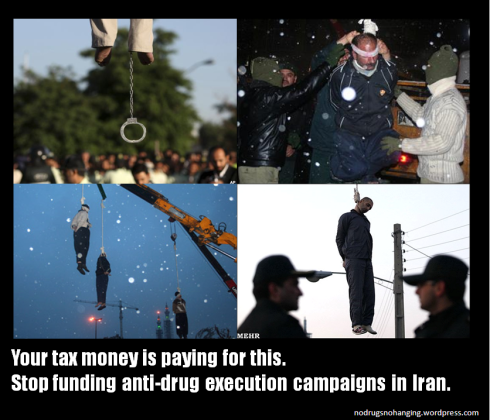The Iranian government had claimed that it is “dedicated to human rights”, furthermore, that Iran is a “beacon of hope” for such rights. However, the Iranian human rights record shows differently. Here are a few things you should know about human rights in Iran:
Death penalty
Since the 2009 uprising against the Iranian regime a stark increase in executions had occurred. The death penalty, which according to international law is allowed only when a defendant is found guilty of the most extreme offenses is routinely introduced in cases where defendants are found guilty of comparatively minor offenses (such as drug offenses). Not only is the death penalty undertaken for minor offenses, but an Amnesty international report found that in many cases convicted criminals were not awarded a fair trial. Furthermore, Iran not only illegally executes criminals, but also executes members of the political opposition; the “International Campaign for Human Rights in Iran” (ICHRI) had reported in 2010 that at least nine political prisoners were executed since the 2009 uprising. Finally, it is important to note that according to a recent Human Rights Watch (HRW) report, execution in Iran is permitted by law for girls from the age of 9 and boys from the age of 15. This not only points toward the murder of children (HRW note that Iran leads the world in the execution of juvenile offenders), but also towards discrimination based on gender (further discussed billow).

Freedom of expression
The Iranian regime widely oppresses freedom of expression. Not only does the regime attempt to control the content published on the internet, but the regime also actively oppresses protests by the use of imprisonment and force. For example, in February Ann Harrison, Amnesty International’s deputy director of the Middle East and North Africa program had stated that “in Iran today you put yourself at risk if you do anything that might fall outside the increasingly narrow confines of what the authorities deem socially or politically acceptable…anything from setting up a social group on the internet, forming or joining an NGO, or expressing your opposition to the status quo can land you in prison”.
Women Rights
As noted above the Iranian legal system discriminates on the basis of gender. Indeed, the ICHRI reported that “Iran’s criminal code deeply violates the principle of equality embedded in the universal declaration of human rights”. Violations of women rights in Iran are apparent in all levels of society, for example, Iranian Nobel prize laureate Shirin Ebadi had demanded a UN investigation into the baring of Iranian women into more than 70 university degree courses. Furthermore, ICHRI reported that “women suffer legal discrimination with regards to their obligations to obey husbands; restrictions on travel; divorce; legal custody and nationality of children; the right to work” and more. Indeed, ICHRI reported such gruesome facts as the permission to legally murder a wife if she is suspected of committing adultery
Treatment of minorities
In June 2012 the European Parliament condemned Iran’s violation of minorities rights. In a damming article by the FIDH (the International Federation for Human Rights) titled “The Hidden Side of Iran- discrimination against ethnic and religious minorities”, the FIDH outlined the extensive discrimination against minority groups. The FIDH had noted that contrary to the Iranian regime’s claim that there is no religious discrimination in Iran, the Islamic republic’s constitution actually states that the specific Muslim religious school- “the Twelver Ja’afari School of Shia” – is the official religion of Iran, with Suni Muslims being granted a higher status than other religious minorities. Furthermore, according to the FIDH report the Iranian constitution does not recognize a number of faiths, which include (among others) “the Bahai faith, and various branches of Sufis”. Moreover, according to the Iranian constitution, atheists or non-believers have no right to exist. The FIDH noted that the ongoing deliberate refusal of recognizing other religious or belief systems is “in stark contrast to Article 18 of the International Convenient on civil and Political Rights to which Iran is a state party…and contravenes Article 18 of the Universal Declaration of Human Rights”.
The following examples are among the countless religiously based discriminating laws in Iran noted by the FIDH: only a Shia muslim can be elected as president (and only muslims can be parliament members); a muslim man can marry a non-muslim women but not vice versa; a non-muslim would be sentenced to death if he is found to engage in same-sex relations, while a muslim will “only” be lashed; people are allowed to choose their own profession as long as it is not contrary to Islam; a student cannot be selected to university if he/she is hostile to the Islamic republic of Iran (hostility includes “promoting materialism or man-made religions) etc’.
With reference to ethnic communities, the FIDH reported that official documents of the Iranian regime fail to report the population figure of the many ethnic minorities residing in Iran. Discrimination against ethnic minorities is wide spread, apart from denying ethnic minorities the opportunity to learn their mother tongue, they also suffer from many other discriminatory realities, for example; Arabs in Iran suffer from low employment rates compared to national average, Azeris suffer from disrespect and inconsideration to their culture and language (e.g. Azeri military personnel have been expelled because they took part in Azeri-Turkic cultural activities and celebrations), Kurds suffer due to being both Sunnis and an ethnic group- they are denied political, economic and religious rights.
It can clearly be seen from the above that Iran is no human rights “beacon of hope” under the current regime, rather Iran it is the symbol of deep despair. The “rights” and obligations given to the Iranian citizens are far from humane, rather they are inhumane.











